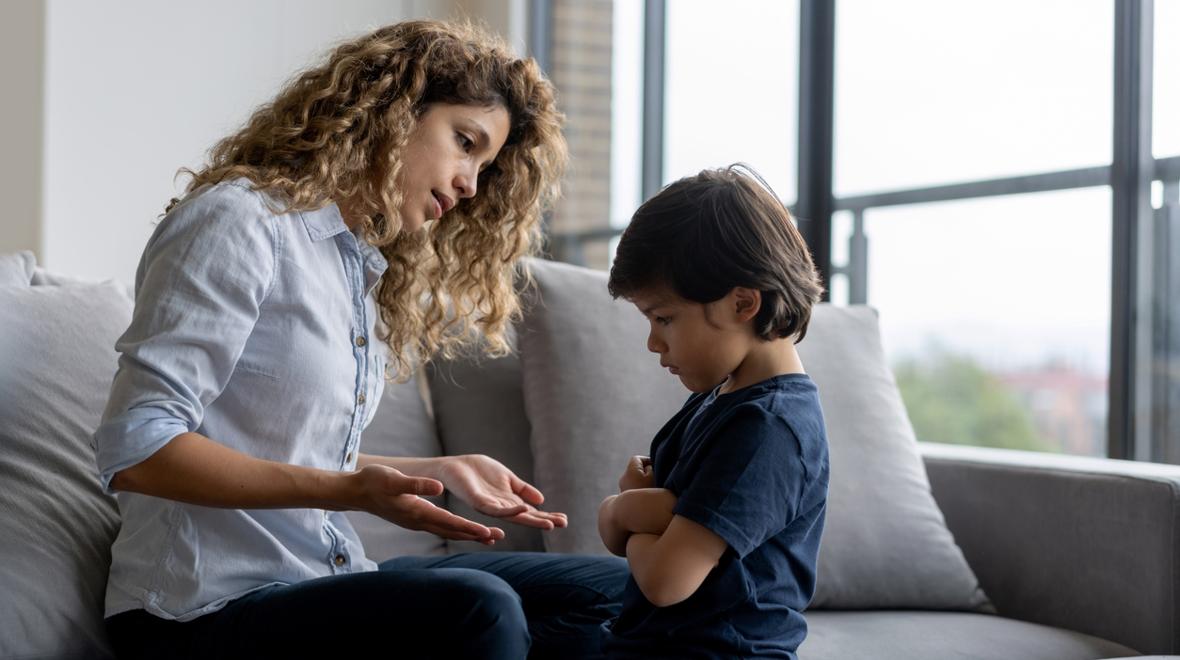
Photo:
iStock
“Nope, wasn’t me,” he said, the chocolate still visible at the corner of his mouth. Though I was teasing (I really didn’t care who ate the last slice of birthday cake), my then-4-year-old son looked at me with deep sincerity as he lied. I shrugged it off as something all kids do — lie, or at least tell what we call “harmless lies” or “fibs.” But it got me wondering, should I have been more concerned? And how do I handle it if he tells a bigger lie, about something more important? (Flashes of reckless teen parties dance before my eyes.)
As with all things parenting, there are dozens of variables. Every parent and every kid is different. So I dug in, did some research and talked with some experts about why kids lie at different ages and what, if anything, we should do about it.
Why do kids lie?
Toddlers
It turns out lying isn’t necessarily a bad thing in young kids. “A child’s ability to lie signals important developmental milestones, such as theory of mind and perspective-taking,” says Meg Tibayan, parent and cofounder of Bright Sprouts. Toddlers tend to lie or exaggerate, but it’s pretty typical. Kristie Tse, a licensed mental health counselor (LMHC) and founder of Uncover Mental Health Counseling, tells parents, “Young children often lie due to their active imaginations and inability to distinguish fantasy from reality.” Kids at this age may lie or exaggerate because they want something to be true, not because they are intentionally lying.
How to respond
If your toddler tells a lie, reiterate the truth, but don’t shame or punish the child. For example, if your child says they didn’t eat the cake, respond, “Oh, how strange there is chocolate on your face.” You can also make statements that speak to the heart of the matter, such as “I see you like chocolate cake” rather than phrasing it as a question that might trigger a lie. The goal is to start a foundation of open communication without harsh judgment so that children feel safe telling the truth.
Preschoolers
Similar to toddlers, children at this age can lie for pretty innocent reasons. “Generally, younger children, around ages 2–4, might lie to avoid punishment or gain something desirable; these are often impulsive and poorly thought out,” Tibayan explains. Lies are usually in response to a question like “Did you take Jaxon’s toy?” and are not premeditated.
How to respond
Again, use a gentle approach by pointing out what the truth is to counteract the power of the lie, and be clear about the importance of telling the truth. Avoid putting kids in a position where they might immediately deny something by stating facts instead of asking them a question.
Early elementary (ages 5–8)
The early elementary years are also full of big milestones, which means lies can start to get a little more complex. “As children grow older, from ages 5 to 8, their lies become more intricate and serve social purposes, such as preserving self-esteem or fitting in with peers,” Tibayan says. At this stage, lies include ways to avoid consequences or to gain approval. The lies tend to be simple and may increase if a child fears punishment.
How to respond
Avoid shaming kids who are caught lying, but remind them why they don’t need to lie. Be honest and direct with them. Tibayan suggests that fostering communication and working to understand underlying motives are key. “Revolutionizing the conversation around lies as simply ‘good’ or ‘bad’ can create a more positive and productive environment for our young learners,” she says.
Upper elementary (ages 8–10)
At this age, children may lie about things such as homework, chores or behavior at school because they want to avoid a consequence. While they still want parental approval, children at this age are also looking to their peers more often for approval. Kids often respond with what they think others (parents, friends) want to hear, even if that’s not the truth.
“Children this age are also beginning to grasp the concept of fudging the truth to spare someone’s feelings,” says Brianna Grant, LCSW, registered play therapist supervisor (RTP-S) and clinical director at TN Voices.
How to respond
“Clearly explain why honesty is important and express understanding that making mistakes is part of growing up,” says Tse. “Encourage them to share the feelings and fears that led to the lie. Reinforce the value of trust by showing appreciation when they do tell the truth. This balanced approach nurtures a sense of security and promotes honest communication.”
The goal is to foster a conversation that values the truth and allows the child to come to you at any time with that truth. For example, you can say, “Are you sure that is how it happened?” which opens the door to let them think about it. In the moment they may not be ready, but making sure children will feel they can come to you at a future time and tell the truth without fear is critical to creating a safe place.
Middle school (ages 11–14)
Ah, middle school. It’s one of the trickier stages to navigate, so it’s no surprise that lies come with the territory. While kids at this age may still be lying to avoid consequences, there are other factors brewing. Grant reminds parents that “social standing and peer relationships are important, so lies may be centered around trying to impress their friends or stretching the truth to gain independence.” Tweens (and teens) may also lie just to avoid discussion. If they are struggling with their grades, they may be exhausted and frustrated and don’t want to have yet another discussion. At this age, kids are processing a lot of feelings, and it’s not always possible for them to articulate this. At this age, most kids aren’t lying arbitrarily or without thought. They are aware of lies and consequences and are using them to avoid a situation they perceive would be worse if they told the truth.
How to respond
If you know they are lying to you (or when you find out), try to get to the root of the problem. Have a frank discussion. While boundaries are important at this age and clear consequences should be laid out and followed through with, it’s also critical to establish with your tween the trust that they can tell you the truth without fear.
“When encouraging truthful conversations with children, I like to say, ‘It’s okay to tell me anything, and I won’t get mad. I’m here to help.’ Another effective statement is ‘Everyone makes mistakes. What matters is that we talk about it and learn from it.’ This reassures them that honesty is valued over perfection and opens the door for more open and honest communication,” Tse advises.
Teenagers (ages 15–18)
“Adolescents are trying to find their own ways in the complex world, and if lying has become the norm for them, it can be somewhat like a habit at that point,” says Melissa Tract a Long Island–based LCSW working with children, teens and young adults through her practice, Mindful with Mel.
Tract reiterates that teens can lie for a host of reasons, including avoiding punishment and trying to fit in or impress others. Teens can also lie as a way of getting more care from parents, a pattern I know well from my own kids: I’d push boundaries, get no response, so I’d push them even more, sometimes to dangerous levels. While the instinct may be to consider kids “old enough to know better,” teens still have very young, developing brains, and punishment without explanation or discussion may result in, you guessed it, more lies.
How to respond
Teenagers are still kids, so it’s important to view their actions with compassion while still being clear about the importance of telling the truth. “Active listening and open communication are crucial in making children feel safe to tell the truth. This approach is key to their emotional development and overall well-being,” Tse tells us. Appropriate consequences (removing devices, restricting social activities) can be employed, but they should be backed up with a conversation about the underlying reasons for the lie. Teenagers may take some time to get there, but keep the door open for an ongoing discussion. The last thing you want is a teen to shut down and not talk to you.
More expert parenting advice: |











